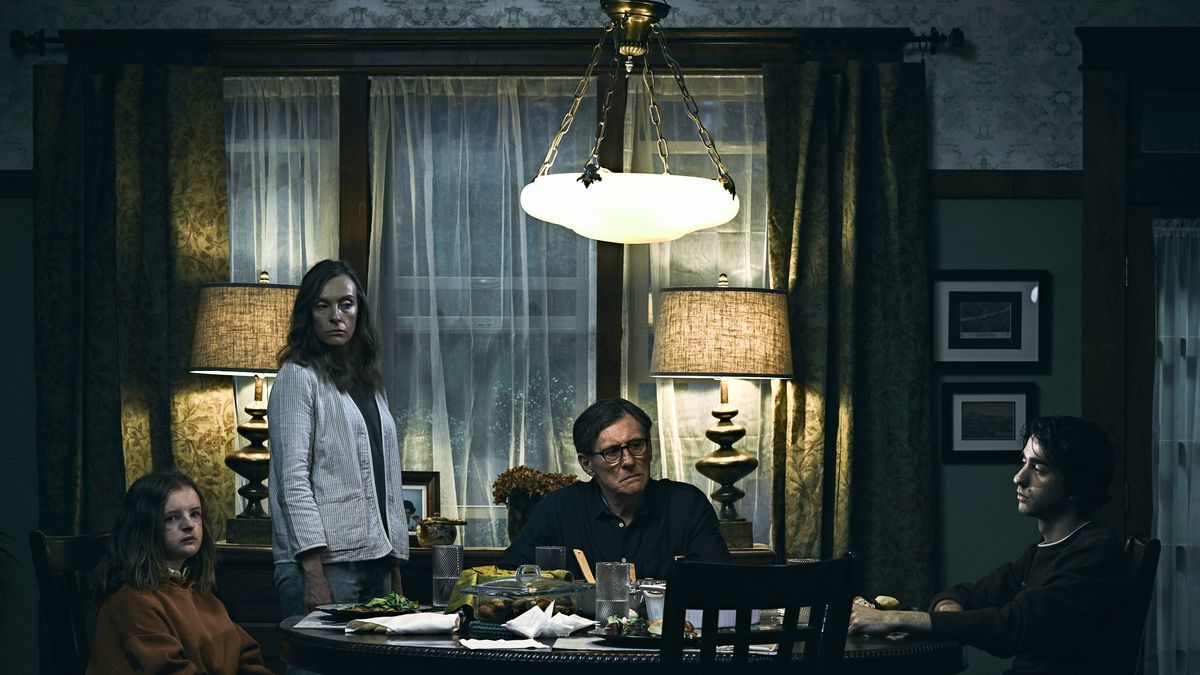The events themselves, begun after the model has morphed into an actual location, find a family getting ready for a funeral. No garments are being rent and no breasts are being beaten, as the death is that of a grandmother who the family had little affection for and vice versa. Annie Graham (Toni Collette), a miniatures artist who provides the impetus for that introductory zoom and daughter of recently deceased Ellen, had a strained and complicated relationship with her mother since the birth of her now-adolescent daughter Charlie (Milly Shapiro, a young actress with a wholly unique look). Husband Steve (Gabriel Byrne) and teenage son Peter (Alex Wolff) are going through the motions and dismiss Ellen’s death as soon as the funeral is over, but Annie keeps thinking she should feel something more than what she actually does and perfunctorily goes to grief counseling. Charlie, the sole recipient of grandma’s affection and a subverbal girl with eccentric habits, finds herself compelled towards ever-odder activities in the wake of Ellen’s death. Frustrated with her daughter, Annie insists that Peter take her with him to a high school party, a cruel request borne partly out of an impulse to break her daughter out of her shell and partly out of a sublimated desire to momentarily rid herself of this weirdo and the clicking noises she keeps making with her tongue. What was a psychological exercise in looming dread subsequently escalates to involve the supernatural and then escalates again into something altogether stranger.
Hereditary’s masterstroke is in how it establishes its muddied mental ground before introducing more recognizable horror elements. There’s a long tradition of horror films allowing for the possibility that the terror the characters are experiencing is all in their heads, and Hereditary makes exactly that case through Collette, who is given long monologues describing anecdotes from her childhood or dreams or her present mental state. If acting is facial control, then she is an actor’s actor, because Annie’s face is a treasure map of hidden emotions that perk up and then recede, thoughts flitting across her eyes and returning to their dark hiding place. There’s a sequence of scenes in the middle of the film that explode with fury and fire, volcanic outbursts that unearth horrid impulses long thought buried. One escapes Annie’s mouth only for her to immediately clamp her hands shut over it, like it escaped accidentally and she’s futilely trying to take it back. Aster has cited Ordinary People as an inspiration, and the dial on that emotionally fraught film is turned up even higher here. When otherworldly forces intrude on Hereditary, it’s almost a relief from the psychological warfare that Aster is waging on his characters.
From that aforementioned high point, Hereditary can only descend. When the film goes from indecipherable human behavior to planned cause and effect, it loses something. For example, in the aftermath of a shocking event, Peter reacts in a way that, from a distance, is unforgivable, but, when viewed from his warped perspective in the moment, makes eminent sense. His actions both seem alien and honest, a contradictory space that so much of Hereditary lives in until a rule-less entity intrudes and any strangeness can be ascribed to it instead of subconscious machinations in the amygdala. Further removing the viewer from the film’s own specific brand of mode and tension is the references and allusions to horror antecedents, which get piled on as the plot picks up speed. What should be an exercise in terror becomes an exercise in recognition of a borrowed implement or movement from some earlier master of the genre.
The full-throttle climax of Hereditary by no means turns the film into a failure, just a different one from what’s come before. The technical crew is working at a high pace from start to finish, and this is a technically robust work. The sound design focuses on details like the buzzing of insects or the scrawling in a notebook, quotidian noises that can quickly give way to disconcerting ones when elevated amongst other sounds. The editing by Jennifer Lame and Lucien Johnston is strongest in its smash cuts, one in particular that haunted this viewer for days after viewing. The final scenes, taking place in an unlit home at dusk, are plagued by shadows and the things hiding in them. It all combines to generate a clamping feeling around the viewer, a sensation that horror films aim for but few achieve. Hereditary is a palpable and lingering experience that eagerly awaits a revisit, even as the stress of enduring it argues against exactly that. B+

 RSS Feed
RSS Feed